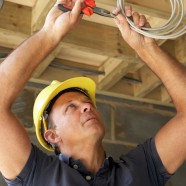
Some electrical wiring problems aren’t dangerous, so they’re not worth tearing apart a room just to upgrade your system. They can be annoying, though, and they’re the perfect candidates for extra projects during a home renovation. Whether your electrical wiring is from your grandmother’s time, or it just got installed the last decade, it can be outmoded and ready for replacement if it’s causing problems. Work with your electrical contractor when planning your home rewiring job to include extra wiring problems you may have.
Lights Flickering When It’s Windy Outside
Unlike some of the annoying circumstances you can fix during a home rewiring bout, this one can actually be dangerous and should be taken care of as soon as possible. The spot where the power lines connect with your house is attached to a fixture. When the wind blows the line around and it rubs on the fixture, parts of the line can fray and cause small breaks in service. These small breaks can cause sparking and a fire hazard, especially during rain storms which is typically when high winds occur. Speak with your utility company. They’ll probably replace your fixture for free, although a home renovation is a good time to do this as you can coordinate your décor with the electrical work.
Too Few Outlets
If your family has grown, your need for electrical power has probably grown even quicker. A home renovation is the perfect time to add more electrical wiring for more outlets in each wall. Families have varied needs for extra outlets, such as:
- A home office with extra computers and printers
- Teenager’s rooms with televisions and stereos
- Outdoor kitchens on decks or patios
- Kitchens with lots of new small appliances
If you’re relying on multiple power strips and extension cords for your everyday life, it’s time to get an upgrade. Your electrical contractor can easily include extra outlets in your renovation plan, solving the problem of having to unplug some appliances before plugging in others.
No GFCIs Installed
GFCIs, or Ground Fault Circuit Interrupters, are designed to immediately turn the electricity off if the plugged-in item comes in contact with water or other types of moisture. These safety features are standard in bathrooms and kitchens, but if you’ve got an older home they may be missing from your rooms. It’s a very simple task for your electrician to switch out one type of outlet for another during a home rewiring job, but it’s crucial for your family’s safety, and may even be required for a renovation, depending on your particular city’s building codes.
Plugs Fall Out of Outlets
You plug in a lamp, and an hour later the plug is laying on the floor. No, you don’t have poltergeists; you just have an older electrical system in your house. Outlets should grip the end of the plug when it’s inserted into the holes. When the clip that’s designed to hold the plug wears out, it allows the plug to slip out and fall to the floor. Unfortunately, this situation can cause arcs, sparking, and a fire hazard. Have your contractor change these outlets as soon as possible.
Power Upgrade Needed
If you’re relying on fans to get through a Florida summer, your home probably needs a power upgrade. With the right type of wiring, adding an air conditioner can result in a surprising amount of energy savings in the long run, between the cold showers you avoid and the efficiency of today’s EnergyStar appliances. A home renovation is the perfect time to upgrade your circuit breaker and wiring, as well as installing new major

Recent Comments